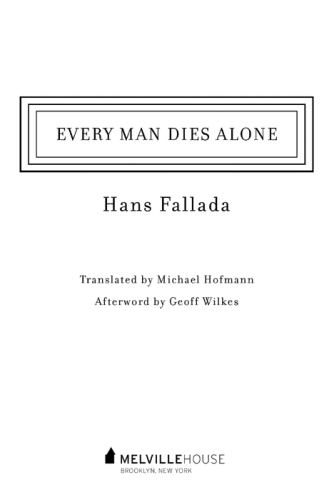
Every Man Dies Alone
کتاب های مرتبط
- اطلاعات
- نقد و بررسی
- دیدگاه کاربران
نقد و بررسی

Starred review from January 12, 2009
This disturbing novel, written in 24 days by a German writer who died in 1947, is inspired by the true story of Otto and Elise Hampel, who scattered postcards advocating civil disobedience throughout war-time Nazi-controlled Berlin. Their fictional counterparts, Otto and Anna Quangel, distribute cards during the war bearing antifascist exhortations and daydream that their work is being passed from person to person, stirring rebellion, but, in fact, almost every card is immediately turned over to authorities. Fallada aptly depicts the paralyzing fear that dominated Hitler's Germany, when decisions that previously would have seemed insignificant—whether to utter a complaint or mourn one's deceased child publicly—can lead to torture and death at the hands of the Gestapo. From the Quangels to a postal worker who quits the Nazi party when she learns that her son committed atrocities and a prison chaplain who smuggles messages to inmates, resistance is measured in subtle but dangerous individual stands. This isn't a novel about bold cells of defiant guerrillas but about a world in which heroism is defined as personal refusal to be corrupted.

Starred review from January 15, 2009
Grim, powerful epic portrait of life in Germany under Nazi rule, published shortly after the author 's death in 1947 but never before available in English.
Fallada was a bestselling novelist before the rise of the Third Reich, but during World War II he was hounded by the Gestapo and psychologically brutalized by Joseph Goebbels, who unsuccessfully tried to force him to write an anti-Semitic book. Sinking into alcohol and drug addiction, he was a broken man by the end of his life, and his final novel is shot through with his despair. Written in a 24-day rush, it was inspired by the real-life case of a working-class husband and wife who conducted a covert three-year propaganda campaign against the Nazi regime. Fallada 's fictionalized version centers on Otto and Anna Quangel, who are driven to protest after learning that their only son has died fighting at the front. The protest is small and timid: Otto writes anti-Hitler messages on postcards that he distributes around Berlin, and the Quangels are never certain if they influence any hearts or minds. Nonetheless, they provoke the Gestapo. Fallada reveals a deep understanding of the agency 's chain of command, its grisly abuses of power and the culture of fear it cultivated among German citizens. His hefty novel includes a host of characters, from hard-drinking reprobates and factory workers to judges and, in a poignant early passage, an elderly Jewish woman in the Quangels ' apartment building who lives in a perpetual state of terror. Most of these people are archetypal to a fault: Otto Quangel rarely strays from a stance of stoic nobility, and the drunken, proud bloviations of Gestapo brass occasionally border on the absurd. The characters ' fates are clearly telegraphed, yet Fallada keeps readers engaged with passionate prose that rushes events along at a thriller-like pace. And there 's stark grandeur in the closing chapters, featuring a Nazi trial, an execution and death in prison.
A very welcome resurrection for a great writer crucified by history.
(COPYRIGHT (2009) KIRKUS REVIEWS/NIELSEN BUSINESS MEDIA, INC. ALL RIGHTS RESERVED.)

February 15, 2009
In the early 1930s, Fallada was one of Germanys most popular novelists; his most famous work, (Little Man, What Now?, 1933) was also well-known in the U.S.; his works have since fallen into obscurity. This selection, one of three Fallada works to be published in English this spring, tells the story of Otto and Anna Quangel, a working-class couple who start planting subversive postcards around Berlin after their only son is killed in the war. Sought by the authorities and beset by nosy and opportunistic neighbors, Otto and Anna find the happiest moments of their marriage. But such moments are fleeting: the couples luck runs out, and they are sent to prison to await their execution. Based on the Gestapo files of a real couple, Falladas story is powerful and bleak, an anguished lament that resistance is necessary yet futile. Penned in just 24 days, this was Falladas final work before dying of a morphine overdose; it may also be his most honest memoir of his life under the Nazis.(Reprinted with permission of Booklist, copyright 2009, American Library Association.)

























دیدگاه کاربران